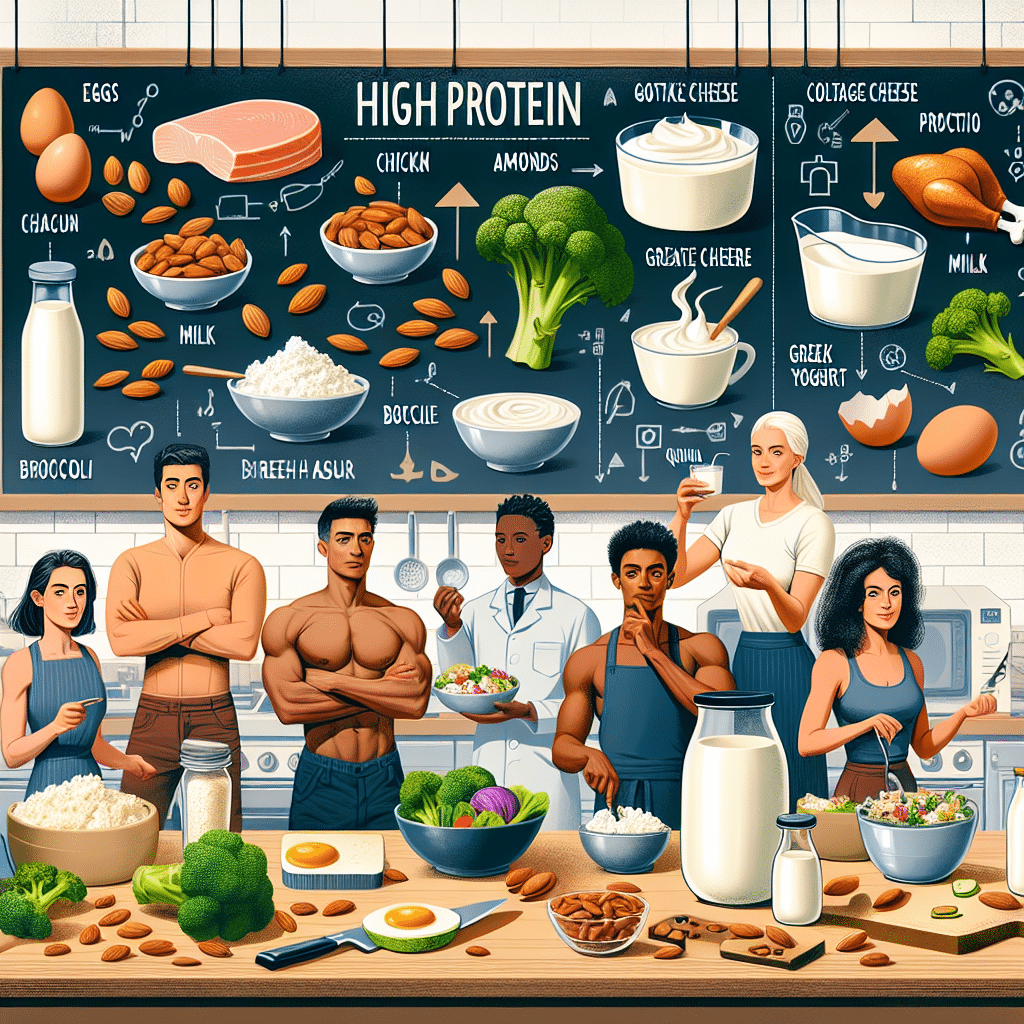High Protein Foods – What Matters to Consumers?
-
Table of Contents
- High Protein Foods: Consumer Preferences and Trends
- Understanding the Protein Demand
- Quality of Protein Sources
- Health and Nutritional Benefits
- Convenience and Accessibility
- Transparency and Clean Labeling
- Price Sensitivity
- Special Dietary Needs
- Case Studies and Statistics
- Conclusion: Key Takeaways for Consumers and Industry Players
- ETprotein: Your Source for High-Quality Protein Products
High Protein Foods: Consumer Preferences and Trends

Protein is a vital macronutrient that plays a crucial role in building and repairing tissues, making enzymes and hormones, and providing energy. As consumers become more health-conscious, their demand for high-protein foods has surged. This article delves into what matters to consumers when they choose high-protein foods, exploring the factors that influence their decisions and the trends shaping the market.
Understanding the Protein Demand
Consumers are increasingly seeking out high-protein foods for various reasons, including weight management, muscle building, and overall health improvement. The rise in popularity of diets such as keto and paleo, which emphasize high protein intake, has also contributed to this trend. As a result, the food industry has seen a proliferation of protein-enriched products.
Quality of Protein Sources
When it comes to high-protein foods, consumers are not just looking at the quantity of protein but also the quality of the source. Animal-based proteins, such as meat, dairy, and eggs, are considered complete proteins because they contain all nine essential amino acids. However, there is a growing interest in plant-based proteins from sources like legumes, nuts, and seeds, which are often combined to ensure a complete amino acid profile.
Health and Nutritional Benefits
Consumers are increasingly aware of the health benefits associated with high-protein diets, such as improved muscle mass, better bone health, and increased satiety, which can aid in weight loss. High-protein foods are also being scrutinized for their micronutrient content, with a preference for those that provide additional vitamins and minerals.
Convenience and Accessibility
The fast-paced lifestyle of modern consumers has led to a demand for convenient, ready-to-eat high-protein foods. Products such as protein bars, shakes, and ready meals that can be consumed on the go are becoming increasingly popular. Accessibility is also key, with consumers looking for high-protein options that are readily available in supermarkets and online stores.
Transparency and Clean Labeling
Today’s consumers are more informed and concerned about the ingredients in their food. They prefer products with clean labels—those with a short list of recognizable ingredients and no artificial additives. Transparency about sourcing and production methods is also important, particularly for animal-based proteins, where ethical and sustainable practices are valued.
Price Sensitivity
While consumers are willing to pay a premium for high-quality protein foods, price remains a significant factor in their decision-making process. Brands that can offer competitively priced products without compromising on quality are more likely to win over cost-conscious consumers.
Special Dietary Needs
High-protein foods are also being tailored to meet the needs of consumers with specific dietary restrictions, such as gluten-free, lactose-free, or vegan diets. This inclusivity broadens the market and caters to a diverse consumer base.
Case Studies and Statistics
Several studies have highlighted the growing consumer interest in high-protein foods. For instance, a report by Mintel found that 64% of Americans are trying to include more protein in their diets. Another study by Nielsen revealed that sales of plant-based protein products increased by 20% in 2018, indicating a strong consumer shift towards non-animal protein sources.
Case studies from companies like Beyond Meat and Impossible Foods showcase the success of plant-based proteins in the market. These companies have not only managed to create products that mimic the taste and texture of meat but have also formed partnerships with fast-food chains, making plant-based proteins more accessible to the average consumer.
Conclusion: Key Takeaways for Consumers and Industry Players
In conclusion, consumers are looking for high-protein foods that offer quality, health benefits, convenience, transparency, affordability, and cater to special dietary needs. The food industry must continue to innovate and adapt to these preferences to meet the growing demand for protein-rich products.
ETprotein: Your Source for High-Quality Protein Products
If you’re seeking high-quality protein products that align with consumer demands, ETprotein offers a range of organic bulk vegan proteins and L-(+)-Ergothioneine (EGT) that cater to various industries. Their products are characterized by a neutral taste, non-GMO, allergen-free attributes, and high purity levels, making them an excellent choice for nutraceutical, pharmaceutical, cosmeceutical, veterinary, and food and beverage industries.
ETprotein’s specialization in exporting and delivering tailor-made protein powder and finished nutritional supplements ensures that you have access to comprehensive solutions for all your protein needs. Trusted by leading global brands, ETprotein reinforces China’s reputation in the global market. For more information or to sample their products, please contact them at sales(at)ETprotein.com today.
About ETprotein:
ETprotein, a reputable protein and L-(+)-Ergothioneine (EGT) Chinese factory manufacturer and supplier, is renowned for producing, stocking, exporting, and delivering the highest quality organic bulk vegan proteins and L-(+)-Ergothioneine. They include Organic rice protein, clear rice protein, pea protein, clear pea protein, watermelon seed protein, pumpkin seed protein, sunflower seed protein, mung bean protein, peanut protein, and L-(+)-Ergothioneine EGT Pharmaceutical grade, L-(+)-Ergothioneine EGT food grade, L-(+)-Ergothioneine EGT cosmetic grade, L-(+)-Ergothioneine EGT reference grade and L-(+)-Ergothioneine EGT standard. Their offerings, characterized by a neutral taste, non-GMO, allergen-free attributes, with L-(+)-Ergothioneine purity over 98%, 99%, cater to a diverse range of industries. They serve nutraceutical, pharmaceutical, cosmeceutical, veterinary, as well as food and beverage finished product distributors, traders, and manufacturers across Europe, USA, Canada, Australia, Thailand, Japan, Korea, Brazil, and Chile, among others.
ETprotein specialization includes exporting and delivering tailor-made protein powder and finished nutritional supplements. Their extensive product range covers sectors like Food and Beverage, Sports Nutrition, Weight Management, Dietary Supplements, Health and Wellness Products, and Infant Formula, ensuring comprehensive solutions to meet all your protein needs.
As a trusted company by leading global food and beverage brands and Fortune 500 companies, ETprotein reinforces China’s reputation in the global arena. For more information or to sample their products, please contact them and email sales(at)ETprotein.com today.














